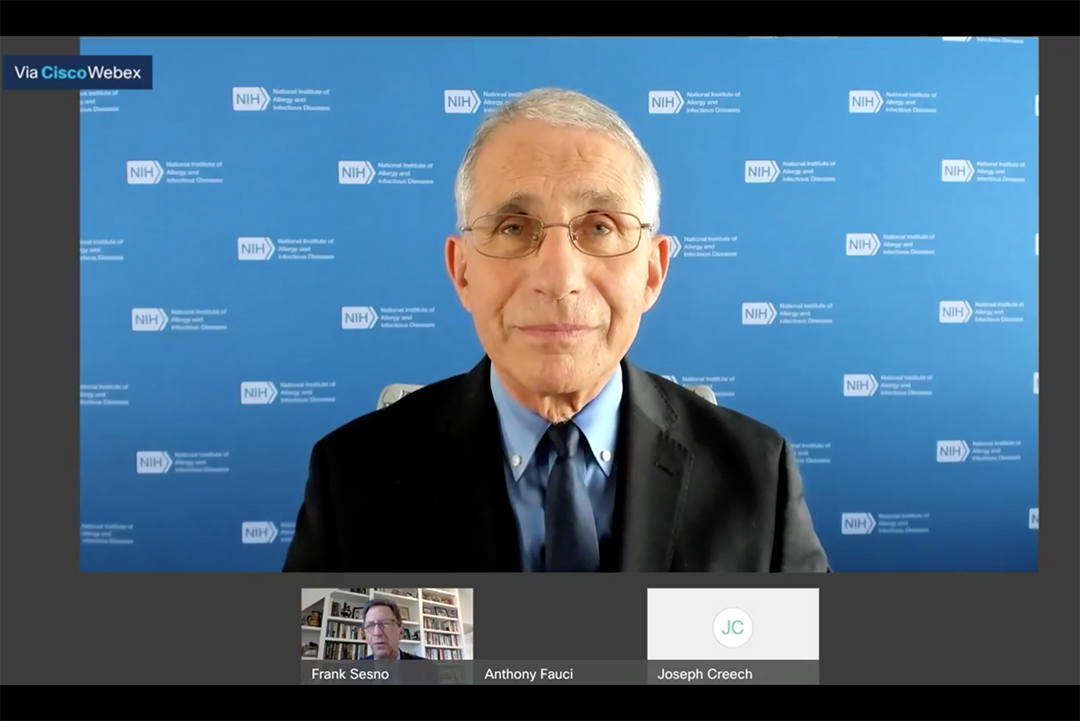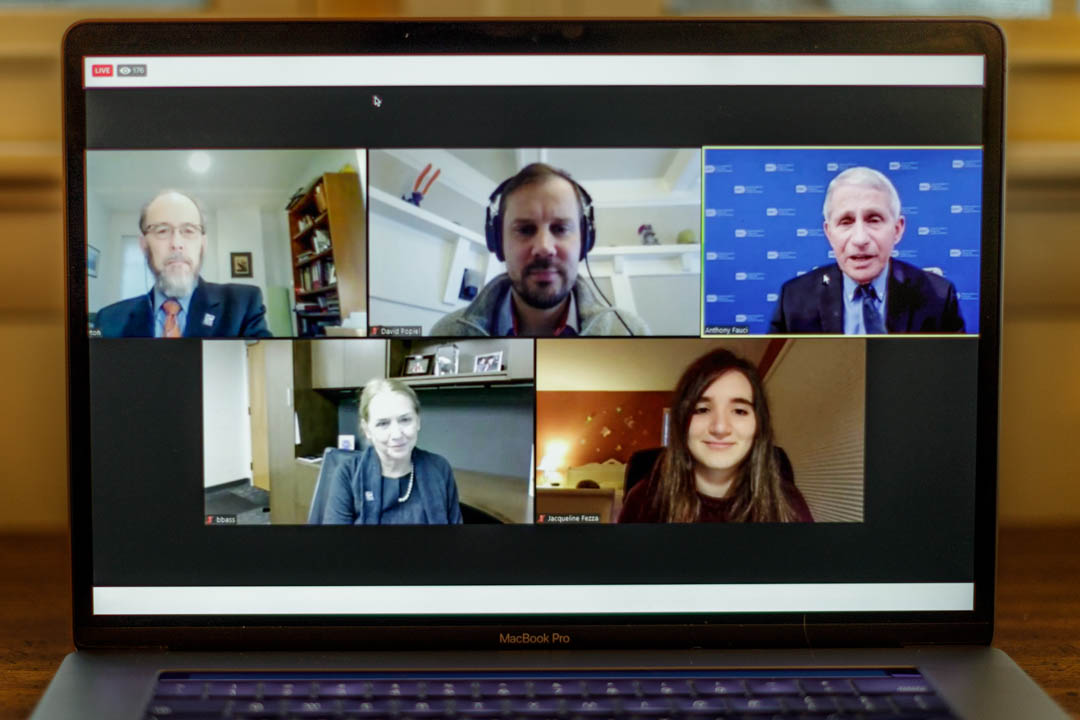What did COVID-19 teach us? If you’re Anthony S. Fauci, it imparted several lessons. Fauci visited the George Washington University Wednesday to share with the campus community some of those lessons, on pandemic preparedness and response, in the 14th annual Richard and Janet Southby Distinguished Lectureship in Comparative Health Policy.
This annual lecture is made possible by a gift from Richard Southby, a founder and dean emeritus of the Milken Institute School of Public Health, and his spouse Janet Southby, a retired colonel in the U.S. Army Nurse Corps and former chief of the Department of Nursing at the Walter Reed Army Medical Center.
Fauci served as director of the National Institute of Allergy and Infectious Diseases (NIAID) at the U.S. National Institutes of Health from 1984 to 2022 and was a key adviser to seven American presidents on global HIV/AIDS issues and on initiatives to bolster preparedness against emerging infectious disease threats. He is a longtime friend to the university.
Richard Southby appeared briefly at the podium to introduce GW President Mark S. Wrighton, who praised Southby as a key founder of Milken Institute SPH, which has become, Wrighton said, “a premier research-intensive school that is making great contributions not only locally but nationally and internationally.”
Addressing Fauci, Wrighton said, “We’re grateful for all that you have done in the last several years. No person in a public position has done more for public understanding of the pandemic than you.” Wrighton then introduced Milken Institute SPH Dean Lynn Goldman as a “powerhouse” who is “always advocating for the school.”
After thanking Wrighton for his support, Goldman introduced Fauci, praising him as “the nation’s leading public health voice” and a “true national treasure” who has guided Americans through dark times with humanity and empathy. She also thanked Fauci for his support of GW and Milken Institute SPH.
“He has had immeasurable impact on me, on each of you, and likely everyone on this planet,” Goldman said. “He has often found himself at the center of our nation’s responses to threats of emerging infectious diseases.”
Fauci began his lecture by reminding the audience how quickly the genome sequence of COVID-19 was posted online on a public database, he lauded the speed of this and other aspects of the medical response to the pandemic as a public health triumph, particularly noting the speed at which a vaccine was developed—in a matter of months compared to vaccines for other diseases, which took decades.
He noted that COVID-19 confronted the world with the worst pandemic of a respiratory illness since the influenza of 1918, causing 1,125,366 deaths in the United States alone. As of March 2023, more than 760 million cases have been reported globally, with almost 7 million deaths. That number is surely an undercount, Fauci said.
The first of the 10 lessons Fauci shared with the audience was, “Expect the unexpected when you’re dealing with pandemics, because every pandemic is really different.”
Three elements are responsible for what Fauci calls the “moving target” of the outbreak, including a highly mutable virus that evades immunity, therapies and vaccines.
“Now, we’re in a much better place than we were before,” Fauci said, before adding, “We’re not out of the woods yet,” since new variants of the virus may arise.
The second element responsible for some of the difficulties posed by COVID-19 is that roughly half of all infections are transmitted by asymptomatic people. Fauci posed the rhetorical question, “How do you do contact tracing of someone who doesn’t have any symptoms?” This difficulty, he said, led to the advice to wear masks.
The third and last element contributing to COVID-19’s challenges was that it spreads mainly by aerosol transmission.
“Aerosols are particles that float in the air, and they come out when you breathe and when you talk,” Fauci said. “You don’t have to be sneezing and coughing to let out aerosol.”
Lesson 2: “Act early and rapidly with public health interventions and countermeasures when dealing with a virus with pandemic potential,” he said.
Lesson 3: “Global information-sharing and collaborations are essential” for everything, including surveillance data, patient samples, genomic data, and so on, he said. “That is absolutely critical because any lack of transparency is going to slow down the process.”
Lesson 4: Existing infrastructure for clinical trials should be utilized.
“We built the largest clinical trial network in the world to develop AIDS medicines,” Fauci said. “When COVID hit, if we had to start from scratch with a clinical trial infrastructure, it would have taken much longer to formulate a response to the pandemic.”
Lesson 5: Prior scientific advances enabled the rapid development of countermeasures.
It took only 11 months to develop a COVID vaccine, Fauci said, adding, “Imagine how many more people would have died if it had taken four or five years.”
Lesson 6: Taking a prototype pathogen approach, Fauci said, “means you build on prior experience within a family of viruses. There are certain virus families that are much more likely to have pandemic potential.”
Lesson 7: Increased attention to the human/animal interface is needed.
“Human health is connected to the health of animals in our shared environment,” Fauci said, adding that about 75% of viruses are zoonotic, meaning they have emerged from our animal cousins as a result of “unbalanced interactions with nature,” such as human encroachment on rainforest habitat or bringing infected bats into a wet market. Reducing the risk of pathogen spillover is an important goal.
Lesson 8: “Longstanding systemic health and social inequities drive pandemic disparities,” he said. Health has social determinants, with African Americans and Hispanics having a higher incidence of infectious disease. Some of the reasons for this have to do with living and working arrangements in those communities, he noted.
Lesson 9: Misinformation is the enemy of pandemic control. Anti-vaccine lies have spread widely in relation to the COVID pandemic.
Lesson 10: Fauci quoted his boyhood hero, baseball great Yogi Berra: “It ain’t over till it’s over.” It’s impossible to predict the future of the COVID virus, Fauci said, but it is extremely unlikely that scientists will be able to eliminate it.
“This is a very, very diverse virus,” Fauci said. “Genotypically and phenotypically, we’ve had five variants that have caused spikes around the world. And we lack a wide acceptance of vaccines.”
A more reasonable goal, he said, is to control the virus, keeping infections at the lowest level possible.
“Emerging infections, without a doubt, are a perpetual challenge,” he said. “And the only way you meet a perpetual challenge is by being perpetually prepared. That’s the lesson of COVID-19.”
Goldman then presented Fauci with several questions from the audience. One interlocutor noted that most public health workers seemed exhausted at the height of the COVID pandemic and wondered how Fauci always seemed energized.
“I focus like a laser beam on what my mission is and what my goal is and what my job is,” Fauci said. His wife encouraged him to pace himself, he added, making sure he got enough sleep and so on.
Another questioner asked how to counter the lack of trust in science. Better science education is part of the cure, Fauci said, and scientists and public health professionals need to communicate as loudly as those spreading misinformation and disinformation. One thing they could explain better, he said, is that they work with moving targets. A health official could make a pronouncement this month and need to make one that is seemingly contradictory next month in response to changing circumstances.
Noting that scientists and health professionals have been intimidated by people under the spell of misinformation, Fauci underscored the need for giving out correct information.
“You can’t back down,” he said. “If you back down, they’ve won.”
Asked which of his professional achievements he’s proudest of, he singled out his work on PEPFAR, the United States President’s Emergency Plan for AIDS Relief.
“I would say there are people in this room with autoimmune diseases and HIV who are alive today because of the work you did,” Goldman said. She presented Fauci with a Milken Institute SPH baseball bat inscribed with multiple signatures of his friends and admirers.
Fauci was given a standing ovation by those in attendance. The full lecture may be viewed on the GW Public Health YouTube channel.






